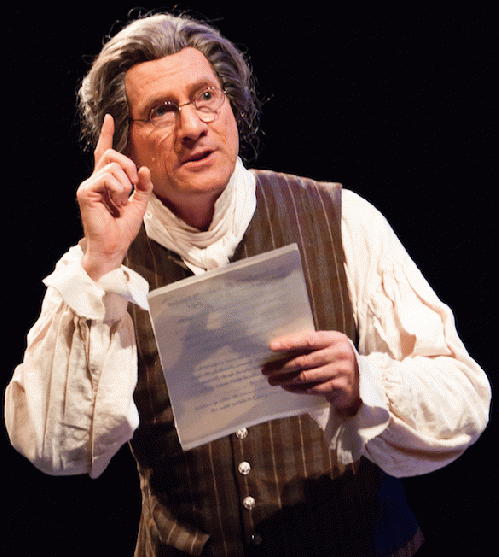Paine said that all men should vote, and that women had the same rights as men--and he would be appalled that there are still attempts to suppress the right to vote, and that the number of votes cast often does not reflect who wins, due to gerrymandering, voting machine "anomalies" casting votes for another candidate, machines without back-up copies of votes cast and, of course, the ultimate high-tech challenge of hanging chads.
Paine would be amazed that Americans landed men on the moon 45 years ago but still can't count votes accurately and worse still, don't seem to care. Paine saw the vote as a fundamental RIGHT for all, not a privilege for a few. This debate began before the Revolution and if America is to ever become a true Republic it must be settled or at some point the Republic will fall. Perhaps Paine would be 18 hours a day on the Internet.
MAB: Thanks, Ian, and what about Paine's views on the role of government?
IR: Paine had a lot to say about government, as did his fellow Founding Fathers:
Governments must be formed through the explicit consent of the people. Governments have no rights, only duty to their citizens. --Thomas Paine, Rights of Man, Part One, 1791Paine today would be in the front lines of the Occupy Movement, demanding that government's only duty was to serve the interests of ALL the people.
On the other hand, John Adams wrote that the United States should be governed "by a few of the most wise and good, the rich, the wellborn and the able."
Alexander Hamilton said "the rich and wellborn should have a distinct, permanent share in the government--to check the imprudence of democracy." Today we have a rich and wellborn one percent that, through their corporations, check the imprudence of democracy by pouring vast sums of money into politicians' campaigns, and they are NOT doing it out of the goodness of their hearts, but for the legislation their politicians will pass on their behalf.
I suspect that today, Paine would say, "a 40-year politician is a politician 36 years too long." He believed--and here we go off a cliff for much of the Washington DC establishment--that those elected were actually elected to serve the people who elected them, that they must never develop interests different to those who elected them, and that they should serve SHORT times as the elected, lest they forget the needs of those who elected them.
If all politicians only served--and the word is served--for 4 years rather than 40, we would be years closer to Universal Health Care and we would have a strong and secure Social Security system and so many of the social services that countries all over the world have, and that all our career politicians have, but that so many Americans do not have.
OK, Paine would be 20 hours a day on the Internet.
So, yes, his words and ideas speak to a long and vital list of issues today. And I have seen his words illuminate audiences and his life, with all its challenges and setbacks and dangers, inspire people to stand up for a better world. How amazing is that!
MAB: It is amazing! And your performances bring him to life in a time that needs him, and needs his ideas. And that is what I see as the highest role of art: to inspire those who experience it, toward becoming the best they can be.
In my observation, art is a more powerful force to change society than politics, because it speaks primarily to the heart and soul, and once the heart and soul are moved, a person can't help but be inspired to greater things.
And it is imperative to evolve toward greater things in the area of racial equality. I'm a hippie child of the 60's, and back then I was involved in civil rights activism. And long before that, my great-great-great-grandfather died at Gettysburg. So I am horrified at the barbarian backsliding we are currently seeing in racial situations, notably with the recent and appalling deaths of Mike Brown, Trayvon Martin and Eric Garner (who died last July from a police-inflicted chokehold after he was arrested for illegally selling cigarettes.) Just last week we saw a videotape released of a Kentucky Fire Chief, Julius Hatfield, offering help to the white person in a two-car accident, while refusing help to the Black family in the other car, as he laughs, saying --We ain't taking no n------ here."
I know that Paine abhorred slavery. What would he have to say about this?
IR: To the Kentucky Fire Chief, Paine would say
(Note: You can view every article as one long page if you sign up as an Advocate Member, or higher).






